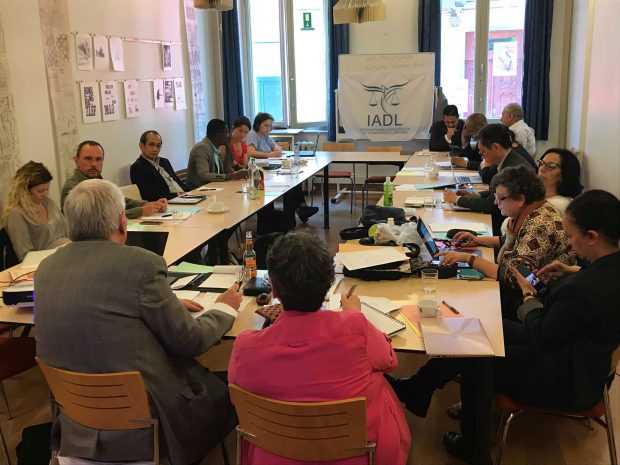Groups accuse Duterte of lying before UN on human rights
President Rodrigo Duterte’s speech before the 75th United Nations General Assembly (UNGA) last Tuesday night, September 22, drew jeers from rights groups, calling his remarks on human rights “malicious” and “perverse.”
They said that the President’s repeated threats against UN investigators and local human rights workers show he lied when he professed open dialogue and constructive engagement before the international community.
While hailing the “properly moderate and constructive” tone the President adopted in his 20-minute pre-recorded video message, the International Coalition for Human Rights in the Philippines (ICHRP) said Duterte used his usual “poisonous language” on the issue of human rights that has led to countless extrajudicial killings in the Philippines in the last four years.
Duterte accused human rights advocates of “weaponizing” human rights in their alleged propaganda against his government.
“They attempt to discredit the functioning institutions and mechanisms of a democratic country and a popularly-elected government which in its last two years still enjoys the same widespread approval and support,” Duterte said.
The President, who also talked about the coronavirus pandemic and the South China Sea struggle with China, assured the UN that human rights are protected in the country.
Duterte was obviously reacting to UN High Commissioner on Human Rights Michelle Bachelet’s report that no less than 8,663 were summarily killed under Duterte’s drug war.
“The Philippines will continue to protect the human rights of its people, especially from the scourge of illegal drugs, criminality, and terrorism,” Duterte said.
‘Perverse redefinition of human rights’
Human rights organizations said Duterte tried to redefine human rights and is simply trying to evade accountability.
“It is perverse for the President to redefine human rights as protection from illegal drugs, criminality, and terrorism, when human rights begin with the right to life, as set out in the Universal Declaration of Human Rights,” Peter Murphy, ICHRP Global Council chairperson, said.
“But the President has repeatedly and recklessly called for lives to be ended, women to be raped, telling his soldiers and police that he will take the blame,” Murphy added.
ICHRP said Duterte’s UNGA speech is a calculated intervention in the deliberations of the ongoing UN Human Rights Council’s 45th Session at the UN’s Geneva, Switzerland headquarters where Bachelet’s report is being considered.
Local human rights alliance Karapatan said Duterte’s remark is a glaring effort “to vilify human rights defenders in the Philippines and to undermine their calls for accountability.”
“Duterte is posturing in making desperate pleas before the international community that is growing increasingly critical of his human rights record and tyrannical rule,” Karapatan secretary general Cristina Palabay said.
International Association of Democratic Lawyers’s Edre Olalia said that facts and record show it is Duterte’s government that has weaponized the law against human rights advocates, defenders, activists, dissenters, media, the opposition and many others.
“There is a gaping disconnect between the truth and the rhetoric that [the Duterte government] will ‘continue to protect the human rights of its people especially from the scourge of illegal drugs, criminality and terrorism,’” Olalia said.
The Commission on Human Rights (CHR) for its part said that while impunity in the Philippines did not start from the Duterte administration alone, his government has a definite role in ending it.
“[O]r, at the very least, not making it worse with present attitudes and behaviors. It is contrary to democracy to depict dissent and protests as efforts to destabilize,” the CHR said.
Lying to the international community
The CHR said that the best way in improving the human rights situation in the country is by encouraging constructive engagement, including open and unhindered access by independent human rights mechanisms and UN special.
The national human rights institution said the government’s law enforcement agencies must cooperate with investigations to ensure that perpetrators of human rights violations are held accountable and punished.
But Duterte’s refusal to allow UN experts into the country shows he lied to the international community, Karapatan said.
“If his administration was truly for an open dialogue and constructive engagement with the UN and independent bodies, then he would’ve allowed the UN High Commissioner for Human Rights and UN Special Rapporteurs to freely conduct an in-country investigation on the sham drug war and other human rights violations,” Palabay said.
Instead, Palabay added, the UN experts’ requests had been met with “threats of violence, wild accusations of foreign meddling, and demeaning insults.”
“The Philippine government even rejected most of the findings and recommendations of the recent report of the Office of the High Commissioner on Human Rights and is currently finding ways to evade independent investigation at the UN Human Rights Council,” Palabay added.
Olalia echoed Palabay’s denunciation, adding that the government declarations it is open to dialogue and constructive engagement with the UN on human rights issues is “a pretense.”
“It is either hypocritical or cynical given its actual attitude and record with respect to the UN Human Rights Council, the ICC and other international venues. Its engagement is nothing short of tokenism, spins, slants and diversions,” Olalia said.
ICHRP urged member States of the UN Human Rights Council to authorize Bachelet’s office to hold a more wide-ranging investigation on the Philippine situation.
“The Duterte government, if it stands by the President’s commitment to the UN principles and to multilateralism, should fully cooperate with such an initiative,” the group said. # (Raymund B. Villanueva)

